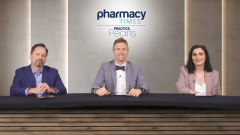
Translating Trials to Practice: Defining Clinically Meaningful Benefits in mCRC
Panelists discuss how the SUNLIGHT trial's success stems from its methodical design with robust single-arm and randomized phase two data that earned NCCN guideline inclusion before the phase three study, comprehensive quality of life data collection, and straightforward methodology, while acknowledging that the absence of consensus definitions for clinically meaningful outcomes in refractory metastatic colorectal cancer forces providers to rely on individual thresholds when evaluating hazard ratios, confidence intervals, and safety profiles, with the additional challenge that different organizational frameworks (ASCO, ESMO) use varying criteria for progression-free survival and overall survival endpoints, making consistent trial interpretation difficult without standardized consensus definitions.
Episodes in this series

The SUNLIGHT trial's success can be attributed to its methodical design approach, which included robust single-arm and randomized phase two data before proceeding to the phase three study. This sequential development strategy provided a strong foundation that had already earned NCCN guideline inclusion based on the strength of the phase two data alone. The trial's comprehensive approach included gathering quality of life data and patient-reported outcomes, which proved valuable for clinical interpretation and patient counseling. The straightforward study design and the fact that the therapeutic strategy demonstrated clear efficacy contributed to its overall success in generating practice-changing evidence.
The absence of consensus definitions for clinically meaningful outcomes in refractory metastatic colorectal cancer presents ongoing challenges for providers when interpreting trial results and making treatment decisions. Clinicians must rely on individual thresholds and professional judgment to determine whether study results represent sufficient benefit to warrant patient treatment. The evaluation process involves examining multiple factors including hazard ratios, confidence intervals, comparison to standard of care, safety profiles, and patient-reported outcomes to create a comprehensive assessment of therapeutic value. The SUNLIGHT study's inclusion of quality of life data, duration of response, and tolerability profile supports its classification as a beneficial regimen that can be confidently recommended to patients.
Current challenges in applying clinical trial frameworks from organizations like ASCO and ESMO stem from the lack of standardized criteria across different evaluation systems. Each framework employs different hazard ratio thresholds, progression-free survival benchmarks, and overall survival time points, making consistent interpretation across trials difficult. The absence of organizational consensus on what constitutes clinically meaningful benefit creates uncertainty when attempting to apply these paradigms to specific clinical trials or patient situations. This variability requires clinicians to understand multiple evaluation frameworks and make informed decisions about which criteria are most appropriate for their clinical context, while biomarker development continues to evolve beyond established markers like RAS and BRAF mutations toward more promising future targets.
Newsletter
Stay informed on drug updates, treatment guidelines, and pharmacy practice trends—subscribe to Pharmacy Times for weekly clinical insights.

























